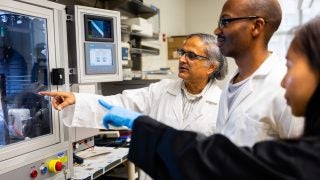Georgetown and the London School of Economics (LSE) have selected the first recipients of a new seed fund that drives high-impact research collaborations between the two schools.
The LSE–Georgetown University Research Seed Fund, launched in March 2025, supports Georgetown and LSE faculty who are partnering to develop solutions to some of the world’s most pressing issues.
Seven Georgetown faculty are among the fund’s inaugural recipients. They are partnering with LSE faculty on five projects that range from monitoring everyday air pollution exposure to examining the impacts of withdrawn U.S. foreign aid. Each project team will receive approximately $25,000, with equal contributions from both universities.
“We are thrilled to congratulate the inaugural recipients of the LSE-Georgetown joint research grants. These successful projects will give us fascinating insights into vital areas of research and hopefully deliver lasting impacts,” said Susana Mourato, LSE vice president and pro-vice chancellor of research. “Cooperation and collaboration, particularly on an international scale, are critical for us to face up to the numerous challenges in the world today.”
This inaugural fund marks the beginning of a collaboration designed to foster academic excellence and spark change. The partnership stemmed from both institutions’ shared commitment to address key global challenges by engaging with policy and international organizations in Washington, DC, and London.
“The selection of this year’s award winners reflects the power of the Georgetown-LSE collaboration to harness the complementary strengths of our two globally respected institutions in advancing innovative, interdisciplinary solutions to some of the world’s most urgent challenges,” said Jeffrey Urbach, vice provost for research at Georgetown. “We were very pleased to see the wide range of compelling collaborative projects proposed for this competition.”
Learn more about the research projects and the Georgetown faculty members behind them.
The Impact of Cancelled U.S. Aid
Who: Jennifer Tobin, associate professor of public policy at the McCourt School of Public Policy at Georgetown; and Ryan Jablonski, associate professor of political science at LSE.
What: Earlier this year, the U.S. government pulled the majority of its funding for international development and global public health. LSE and Georgetown researchers are collecting on-the-ground data from at least five of the countries hit hardest in Sub-Saharan Africa to understand some of the distributional impacts of the change and how governments, NGOs and local communities are adapting. They hope to provide policymakers and academic communities with a deeper understanding of the institutional, political and individual effects of the withdrawn U.S. aid.


